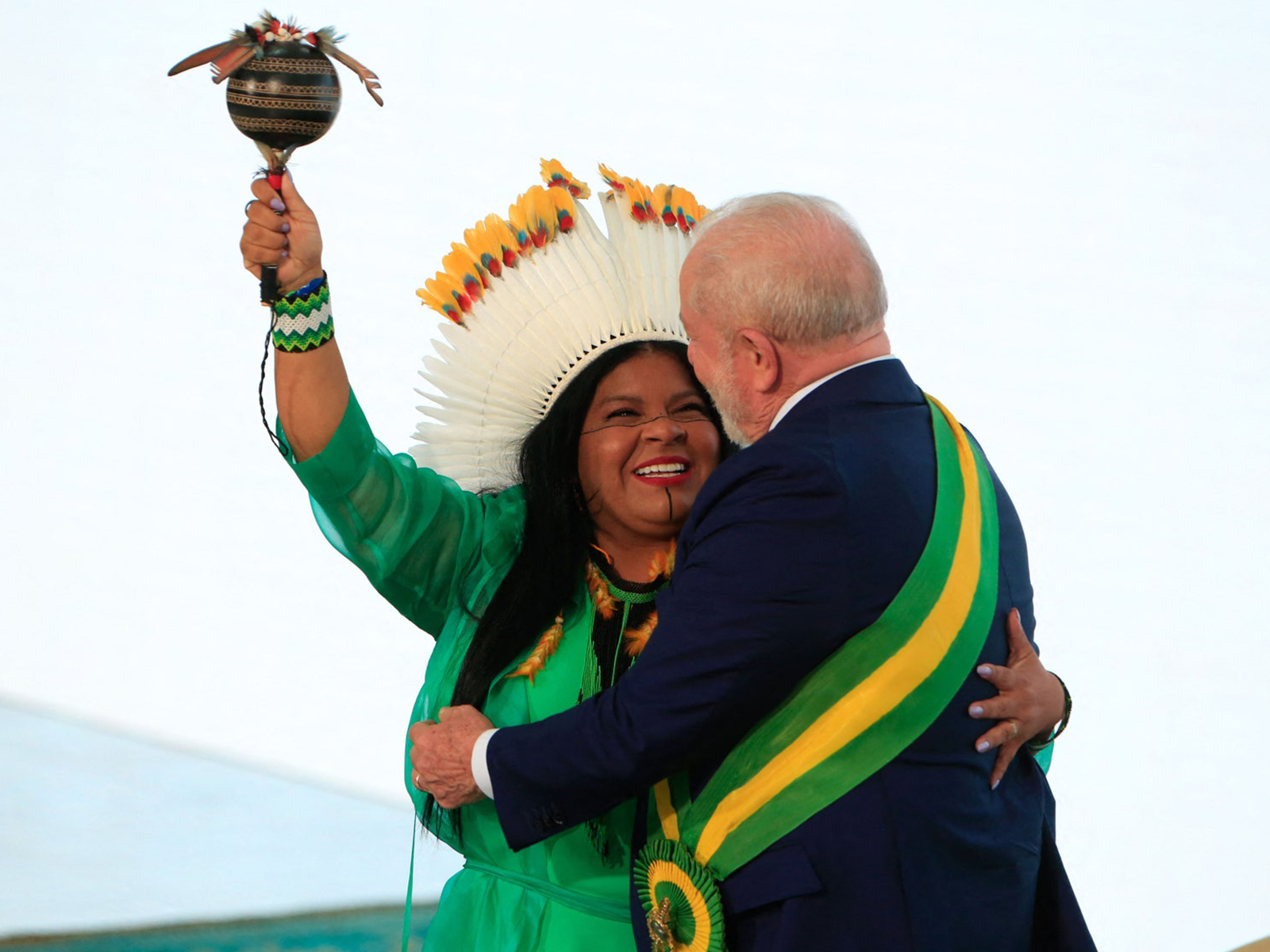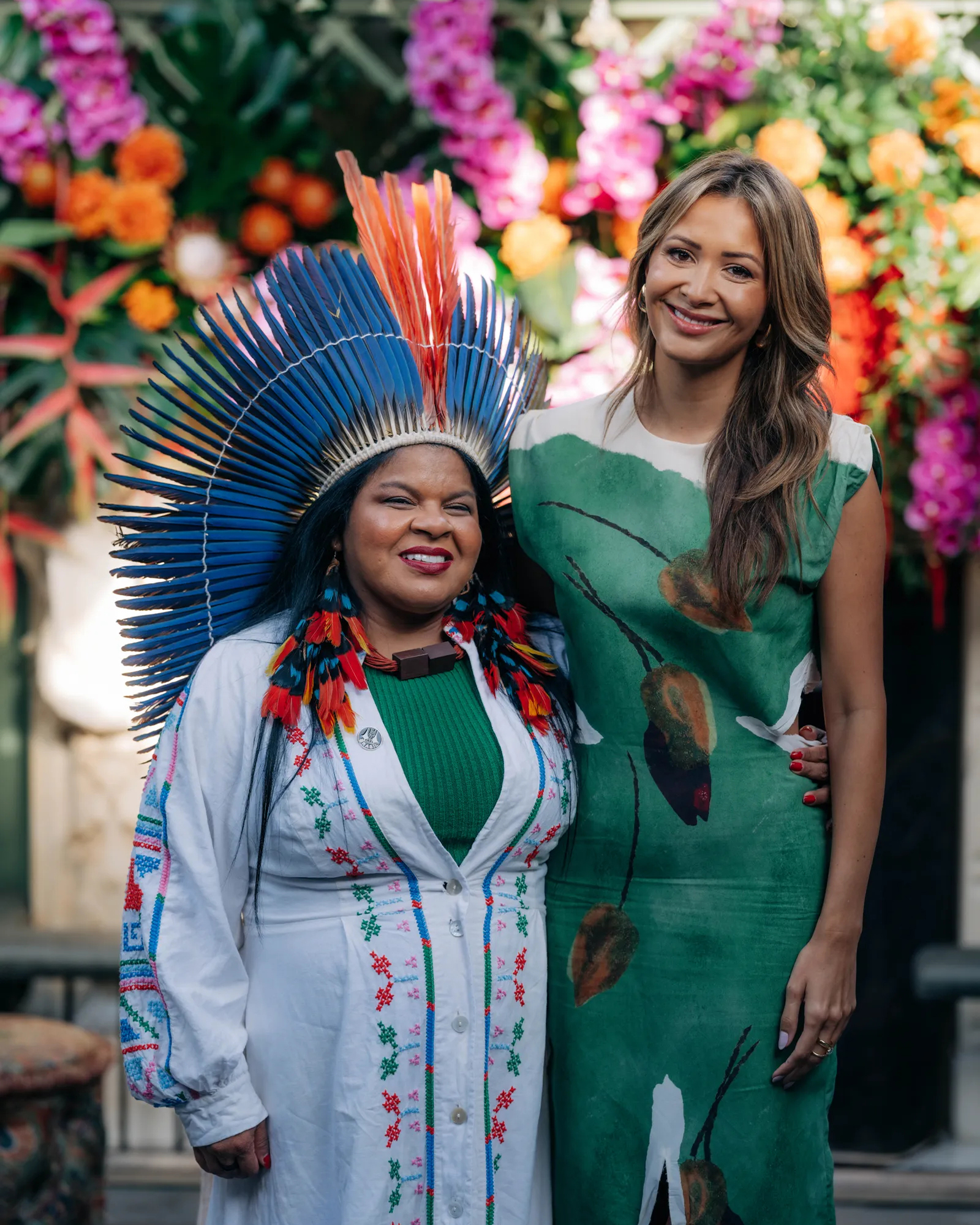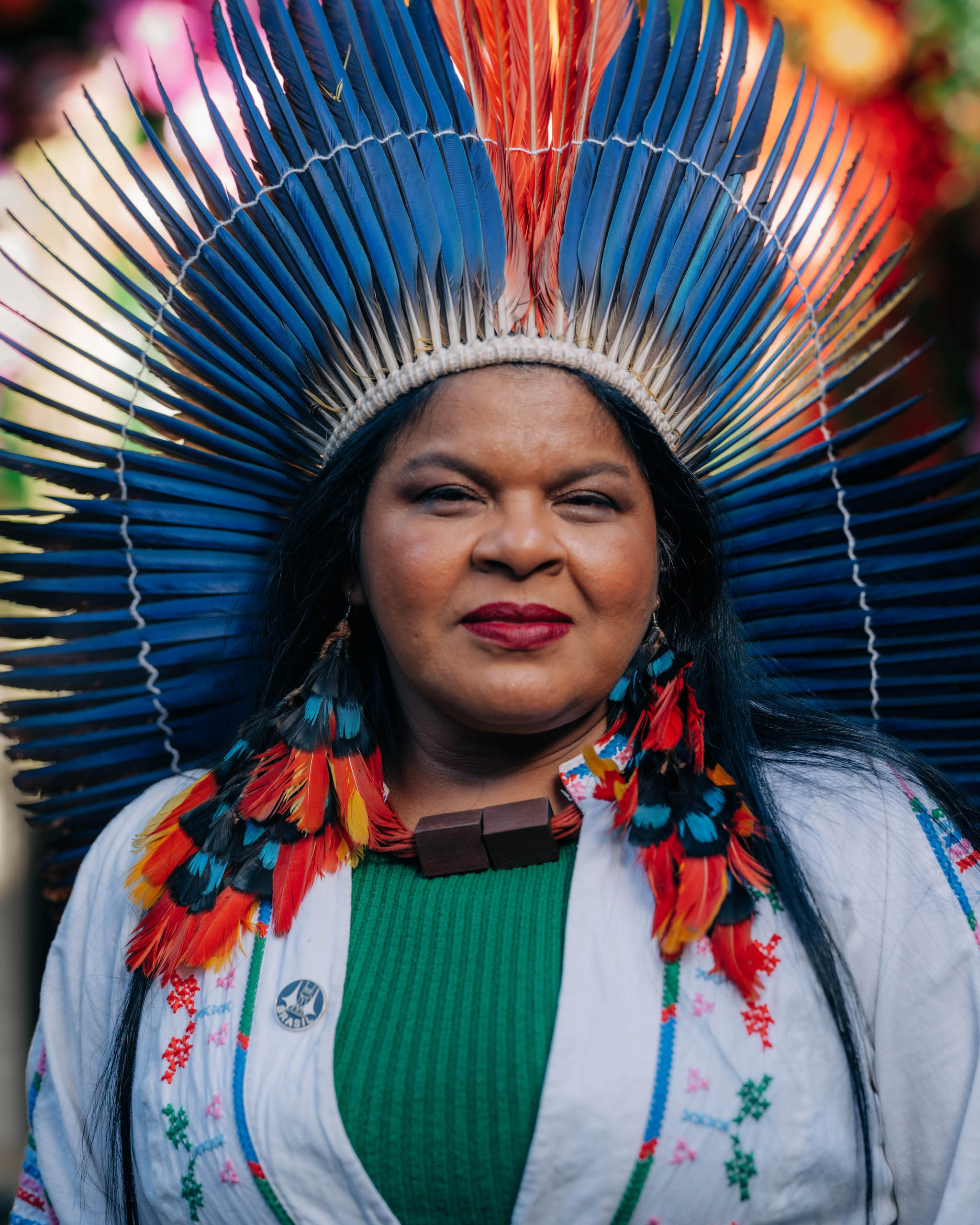Photo by Misan Harriman
Between the devastating floods in Libya that have killed thousands to the recent wildfires in Maui, it’s easy to lose hope when it comes to our ongoing fight against the climate crisis. It’s why, though, it’s also important to celebrate – in the words of Brazilian Indigenous activist Sônia Guajajara – the “small victories”.
We meet just days after Brazil’s Supreme Court ruled against there being a “time limit” on Indigenous peoples’ rights to their ancestral lands – a landmark case that impacts hundreds of native groups who have been evicted from their homes by miners and loggers. Just a month before, Ecuadorians voted to ban oil drilling in Amazon’s Yasuní National Park, highlighting the groundswell of support for a much-needed transition away from fossil fuels.
“Little victories add up to a lot,” Guajajara says via a translator, in the basement of London’s private members’ club Annabel’s, where she has just taken part in a talk celebrating The Caring Family Foundation’s “Annabel’s for the Amazon” campaign. Fresh off a flight from New York, where she had a jam-packed schedule during Climate Week, the activist shows little sign of tiredness, speaking with a glint in her eye and the assuredness of someone who has seen a lot in her 49 years on planet Earth.
Born on Araribóia land in the Amazon, in the northeastern Brazilian state of Maranhão, Guajajara has been fighting for Indigenous rights for as long as she can remember. “When you’re born Indigenous, you’re born an activist,” she explains matter of factly. “I remember well how much we had in terms of forests and animals and rivers. [Since then], the territory has suffered a lot of deforestation, a lot of forest fires, and a lot of rivers and streams have dried up.”

Guajajara left home at the age of just 10 to go to school, eventually going on to get a Master’s degree in culture and society at the Federal University of Bahia, despite her parents not being able to read. After graduating, she went on to work as a teacher and a nursing assistant, but her activism continued. In 2005, she founded The Articulation of the Indigenous Peoples of Brazil (APIB), a network of Indigenous organisations across the country.
“I’ve always considered myself a leader – back in school, I’d love to lead activities,” Guajajara recalls. “What brought me directly into the movement was the struggle for land, [after] listening to the testimonials of Indigenous leaders that didn’t have a territory.”
Earlier this year, Guajajara became Brazil’s first minister for Indigenous peoples, after becoming one of two Indigenous women to be elected to Congress in the country’s general election last October. “The creation of the ministry means a recognition of Indigenous peoples,” she says. “It gives us a central role in politics that we didn’t have before.”
Of course, Guajajara’s historic appointment was precipitated by a major victory for environmentalists globally: the election of leftist president Luiz Inácio Lula da Silva. It marked a huge pendulum swing away from the far-right regime of Jair Bolsonaro, who rolled back environmental measures during his time in power, leading to an area bigger than the size of Belgium being lost from the Amazon in his first three years in office. Not only that, but Bolsonaro’s handling of the Covid pandemic had a devastating impact on Indigenous communities, who have less access to healthcare services. “Not only was his government negligent, but it was working against any actions to protect Indigenous peoples,” Guajajara says.

Now, with Lula in power, the mood has shifted significantly for Indigenous communities and environmental campaigners. “[His victory] gave us renewed hope; it gave people a smile back on their face because people were very sad and afraid [before],” the minister continues. “So we’ve got renewed expectations for the future and we’re really expecting to reconstruct what’s been lost.”
Still, there is no room for complacency, with Brazil experiencing record temperatures of 42 degrees Celsius last month, despite still being in winter. “We are going through a new moment in Brazil, [but] please don’t give up on us, on our struggle,” Guajajara urged the audience at Annabel’s. “We still need a lot of help so that our movements can remain standing up.”
It’s why The Caring Family Foundation, which is the UK’s biggest donor to reforestation in Brazil, is keen to support Indigenous communities, as well as continuing its environmental projects. “Sônia is a true guardian of the rainforest,” Patricia Caring, co-founder of The Caring Family Foundation, says. “Yes, the Amazon is home to the trees, biodiversity, and the ecosystem, but we need to look at it with a wider lens as it’s Indigenous communities that are the key to the Amazon’s survival.”
Given that Indigenous communities look after a staggering 80 per cent of the planet’s biodiversity, despite making up just five per cent of the population, it’s crucial that their voices are heard – particularly considering the dangers that environmental defenders face. “It’s time for the eyes of the world to be on Indigenous women like Sônia who have put their lives on the line to defend our last refuges of biodiversity,” adds Alice Aedy, documentary filmmaker and co-founder of Earthrise, who met Guajajara via her organisation’s Choose Earth campaign in 2021.
It’s a sentiment echoed by Guajajara, who reiterates that supporting Indigenous communities has never been more important. “People need to connect the climate emergency that we’re facing with the actual benefits of protecting Indigenous territories and Indigenous peoples’ ways of life,” she says. “Supporting Indigenous peoples and defending their rights is no longer a choice.”
This article was originally published on British Vogue.
- Back to Buscalan: Apo Whang-Od’s cover story photographer returns for a personal journey
- New Old Ways: In Pursuit of the Preservation of Ifugao Culture
- They Remind Us of Who We Once Were and Truly Are
- A Remarkable “His and Hers” Collection of Antiquities That Weave the Stories of Philippine Nationhood
